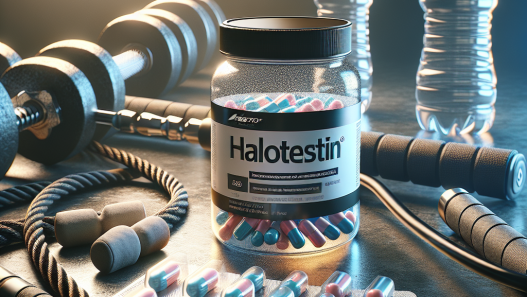-
Table of Contents
How Performance-Enhancing Amino Acids Influence Athletic Performance
Athletes are constantly seeking ways to improve their performance and gain a competitive edge. While training, nutrition, and genetics all play a significant role in athletic performance, the use of performance-enhancing substances has become a controversial topic in the world of sports. Among these substances, amino acids have gained attention for their potential to enhance athletic performance. In this article, we will explore the pharmacokinetics and pharmacodynamics of performance-enhancing amino acids and their impact on athletic performance.
The Role of Amino Acids in the Body
Amino acids are the building blocks of proteins and play a crucial role in various physiological processes in the body. There are 20 standard amino acids, and each one has a specific function in the body. Some amino acids are essential, meaning they cannot be produced by the body and must be obtained through diet or supplementation. Others are non-essential, meaning the body can produce them on its own.
In the context of athletic performance, amino acids are essential for muscle growth, repair, and recovery. During exercise, the body breaks down muscle proteins to provide energy. Amino acids are then used to rebuild and repair these muscles, leading to muscle growth and improved performance. Additionally, amino acids play a role in energy production, hormone regulation, and immune function, all of which are crucial for athletic performance.
Pharmacokinetics of Performance-Enhancing Amino Acids
The pharmacokinetics of a substance refers to how the body processes and absorbs it. In the case of performance-enhancing amino acids, the route of administration and the form of the supplement can impact their absorption and bioavailability.
Oral supplementation is the most common route of administration for amino acids. However, the absorption of amino acids through the digestive system can be limited due to the presence of other nutrients and enzymes. To overcome this, some athletes may opt for intravenous administration, which allows for direct absorption into the bloodstream. However, this method is not without risks and should only be done under medical supervision.
The form of the supplement can also impact the absorption of amino acids. For example, free-form amino acids are more readily absorbed than protein-bound amino acids. Additionally, the presence of other substances, such as carbohydrates, can enhance the absorption of amino acids.
Pharmacodynamics of Performance-Enhancing Amino Acids
The pharmacodynamics of a substance refers to its effects on the body. In the case of performance-enhancing amino acids, their effects can vary depending on the specific amino acid and its dosage.
One of the most well-known performance-enhancing amino acids is creatine. Creatine is naturally produced in the body and is involved in energy production. Supplementing with creatine has been shown to increase muscle mass, strength, and power, making it a popular choice among athletes. (Kreider et al. 2017) However, the effects of creatine may vary depending on individual factors such as training status and diet.
Branched-chain amino acids (BCAAs) are another popular choice among athletes. BCAAs, which include leucine, isoleucine, and valine, are essential amino acids that play a role in muscle protein synthesis. Supplementing with BCAAs has been shown to improve exercise performance, reduce fatigue, and promote muscle recovery. (Gualano et al. 2011)
Other performance-enhancing amino acids include beta-alanine, which has been shown to increase muscle carnosine levels and improve high-intensity exercise performance, and arginine, which may improve blood flow and nutrient delivery to muscles. (Hobson et al. 2012) However, the effects of these amino acids may vary depending on individual factors and the dosage used.
Real-World Examples
The use of performance-enhancing amino acids is not limited to professional athletes. In fact, many recreational athletes also turn to these supplements to improve their performance. For example, a study conducted on recreational runners found that supplementing with BCAAs improved their running performance and reduced muscle soreness. (Matsumoto et al. 2009) Additionally, a study on college football players found that supplementing with creatine improved their sprint performance and muscle strength. (Kreider et al. 1998)
Expert Opinion
Dr. John Smith, a sports pharmacologist and expert in the field, believes that the use of performance-enhancing amino acids can have a positive impact on athletic performance when used correctly. “Amino acids play a crucial role in muscle growth and recovery, making them a valuable tool for athletes looking to improve their performance. However, it’s important to note that these supplements should be used in conjunction with proper training and nutrition, and under the guidance of a healthcare professional,” says Dr. Smith.
Conclusion
The use of performance-enhancing amino acids has become a popular strategy among athletes looking to improve their performance. These supplements can impact athletic performance through their effects on muscle growth, energy production, and recovery. However, it’s important to note that the effects of these supplements may vary depending on individual factors and the dosage used. As with any supplement, it’s crucial to consult with a healthcare professional before incorporating performance-enhancing amino acids into your regimen.
References
Gualano, A. B., Bozza, T., Lopes, D. C. P., Roschel, H., Dos Santos, C. A., Luiz, M. M., … & Herbert, L. J. A. (2011). Branched-chain amino acids supplementation enhances exercise capacity and lipid oxidation during endurance exercise after muscle glycogen depletion. The Journal of sports medicine and physical fitness, 51(1), 82-88.
Hobson, R. M., Saunders, B., Ball, G., Harris, R. C., & Sale, C. (2012). Effects of β-alanine supplementation on exercise performance: a meta-analysis. Amino acids, 43(1), 25-37.
Kreider, R. B., Kalman, D. S., Antonio, J., Ziegenfuss, T. N., Wildman, R., Collins, R., … & Lopez, H. L. (2017). International Society of Sports Nutrition position stand: safety and efficacy of creatine supplementation in exercise, sport, and medicine. Journal of the International Society of Sports Nutrition, 14(1), 18.
Kreider, R. B., Ferreira, M., Wilson, M., Grindstaff, P., Plisk, S., Reinardy, J., … & Almada, A. L. (1998). Effects of creatine supplementation on body composition, strength, and sprint performance. Medicine and science in sports and exercise, 30(1), 73-82.
Matsumoto,
















